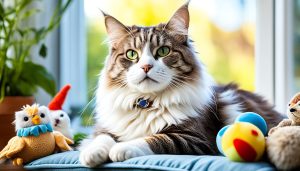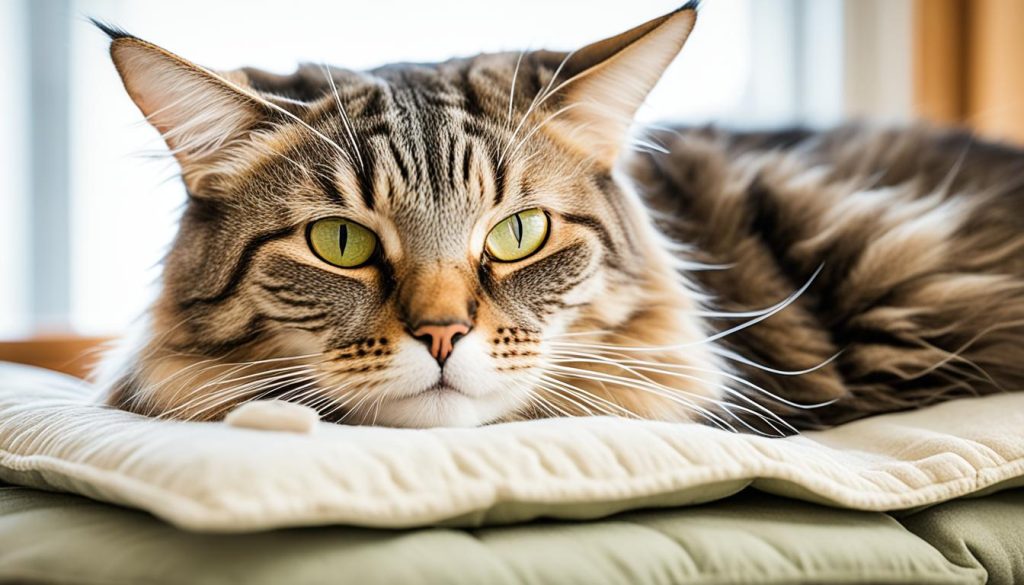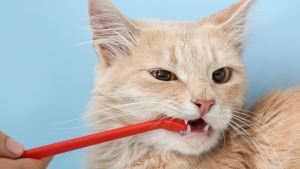As cats get older, they need extra care for their health. Nowadays, with better food and vet care, cats live longer. They become seniors at about 12 to 14 years old.
Getting older is not a sickness. However, older cats can face health issues and act differently. It’s important to take them to the vet often. We also need to make sure they’re comfortable and eat right. This helps in taking care of an older cat.
Key Takeaways:
- Cats are living longer and reaching their senior years at around 12 to 14 years old.
- Regular veterinary check-ups are crucial for the health of senior cats.
- Creating a comfortable environment for senior cats is important.
- Addressing specific dietary needs is necessary for the well-being of senior cats.
- Senior cats are more prone to certain health conditions and behavior changes.
Signs of Aging in Cats
As cats grow older, they start to show aging signs. Cat owners need to spot these signs early. This way, they can tell them apart from health issues or teeth problems. Seeing the vet when needed helps keep senior cats healthy.

Physical Changes
One clear sign of aging in cats is they move less. Older cats often sleep more. They may lose or gain weight. It might get harder for them to jump to places they once loved. This is due to less strength and mobility.
Behavioral Changes
Older cats also act differently. They might not like things they used to enjoy. You may notice changes in how they use the litter box. They might have more accidents. Their meowing or cleaning themselves could change too.
These changes might just be because they are getting old. But it’s key to check if health issues or dental problems are not the cause. Talking to a vet can help. They can give the right care for your aging cat.
| Signs of Aging in Cats | Cautionary Considerations |
|---|---|
| Decreased activity levels | Monitor for possible health conditions |
| Increase in sleep duration | Ensure adequate rest and comfort |
| Weight changes (loss/gain) | Discuss with a veterinarian to determine nutritional needs |
| Difficulty reaching favorite spots | Consider making adjustments to the living environment |
| Behavioral changes (irritability, changes in litter box habits) | Rule out underlying health conditions or dental problems |
It’s vital to notice aging signs in cats and care for them properly. Knowing what these changes mean and getting vet advice keeps senior cats happy and comfy.
Veterinary Care for Senior Cats
Regular check-ups are key for older cats. It’s advised to have exams twice a year for older cats. These exams spot and manage health problems that may appear as your cat ages. They include blood tests, urine tests, and blood pressure checks. These help assess their health and find any diseases. It’s also critical to talk about the right diet during these visits.
The vet will do a detailed physical exam on your senior cat. They’ll look for signs of sickness or changes. Blood tests will check how well organs are working and find health issues. Urine tests check kidney function and look for infections. It’s also important to check blood pressure, as high blood pressure is common in older cats.
Talking about your cat’s diet with the vet is very important. Older cats need different nutrients than younger ones. A balanced diet is crucial for their health. Your vet will advise on the best food, how much to feed, and any supplements needed. This helps ensure your senior cat gets what they need to stay healthy.
Recommended Senior Cat Veterinary Care Schedule
| Age | Veterinary Care |
|---|---|
| 7-10 years | Yearly check-up, including blood work and urine testing |
| 10-14 years | Biannual check-ups, including blood work, urine testing, and blood pressure checks |
| 14+ years | Biannual check-ups with comprehensive geriatric evaluation, including blood work, urine testing, blood pressure checks, and X-rays as needed |
Staying on top of vet care is essential for senior cats. Being proactive about health can help your cat enjoy a high-quality life as they get older. Addressing health issues early is key to a happy and comfortable life for them.
Creating a Comfortable Environment
As cats age, it’s important to make their lives comfy. They need a few changes to stay well. You can make a happy, healthy space for them.
1. Easy Access to Essential Resources
Make sure your older cat can easily get to food, water, and litter boxes. Put these on every floor. This helps them move less and keeps them comfortable.
2. Ramps or Steps for Accessibility
Older cats might find it hard to jump onto high spots. Ramps or steps can help. This way, they can safely enjoy their favorite places.
3. Warm and Draft-Free Resting Area
Old cats need a warm place without drafts. Give them a cozy bed in a quiet spot. Make sure it’s warm, especially when it’s cold.
4. Nightlights for Cats with Vision Problems
Some older cats can’t see well in the dark. Nightlights can help them see and move safely. This reduces their anxiety and prevents accidents.
5. Additional Support for Grooming
Grooming can be tough for old cats. They might not reach all spots. Helping them stay clean and healthy is good. Always be gentle and considerate.
Creating a comfy space shows your love for your senior cat. Making small changes helps them enjoy life. You can make their golden years great.
Grooming and Maintenance for Senior Cats
As cats get older, they may not groom themselves as well. Regular grooming is key to their health. Grooming removes loose hair, boosts blood flow, and keeps their coat shiny. For cats with long hair, **frequent grooming** is vital to avoid painful matting. Blind or vision-impaired cats need familiar surroundings to feel safe.
When handling a deaf cat, be extra gentle so you don’t scare them. Here’s how to care for older cats:
1. Brushing and Combing
Brushing or combing regularly is important. It **removes loose hairs** and stops mats from forming. This keeps their coat looking good and their skin healthy. Use a **soft-bristled brush** or the right comb, and be careful with knots.
2. Providing a Calm Environment
For cats that can’t see well, a **calm and stable environment** is crucial during grooming. Choose a quiet spot without distractions. This reduces their stress and helps them feel safe.
3. Nail Trimming
Keeping nails short is a must for elderly cats. Long nails can hurt and make walking hard. Use **cat-specific nail clippers** and trim just the tip to avoid pain. If cutting nails makes you nervous, ask a vet or a pro groomer for help.
4. Handling with Care
Be gentle with cats that can’t hear well. Avoid sudden moves or loud sounds that might startle them. Talk softly and wait for them to get used to you before you start grooming.
5. Consulting a Professional Groomer
If grooming your older cat seems daunting or they need special care, talk to a professional groomer. They know how to handle elderly cats and can give you useful advice. They make sure your cat gets groomed without any hassle.
Patience and understanding are key when grooming older cats. Adapt to what your cat needs and get help when needed.
| Grooming Tips for Senior Cats: |
|---|
| Regular brushing or combing |
| Providing a calm environment |
| Nail trimming |
| Handling with care |
| Consulting a professional groomer |
Senior Cat Diet and Nutrition
It’s vital for the health of senior cats to have the right diet. As they get older, their nutritional needs change. It’s a good idea to talk to a vet about the right food and calories for an older cat.
Senior cats need to drink plenty of clean water. Their kidneys may not work as well as they used to. To help them drink more, mix wet and dry food. This increases moisture in their diet and keeps them hydrated.
Old cats need food that’s easy to digest and has lots of protein. This helps keep their muscles strong. Because their stomachs might not work as well, easy-to-digest food is key. And, extra protein keeps their muscle mass up as they age.
It’s also smart to give older cats small meals several times a day. This way, they don’t eat too much at once and stay a healthy weight. Small, regular meals mean they get constant nutrients and energy.
Nutritional Recommendations for Senior Cats:
- Consult with a veterinarian to determine the appropriate nutrition and calorie intake for your senior cat.
- Ensure access to clean water to support kidney function and hydration.
- Mix canned and dry food to increase water intake.
- Choose easily digestible diets to support proper digestion.
- Incorporate higher protein content in your cat’s diet to preserve muscle mass.
- Feed smaller, frequent meals throughout the day to prevent overeating and maintain a steady nutrient supply.
By giving your senior cat the right diet, you help them stay healthy and active. A good diet means they can enjoy their later years to the fullest.
Mental and Behavioral Care for Senior Cats
As cats grow older, they might start to show signs of mental change. This can change how they act and feel. It is very important to take care of their mental and behavioral needs to keep them happy and healthy.
Keeping a regular routine is crucial for aged cats. They love following a set pattern every day. For instance, feed them and play with them at certain times. This helps lessen their stress and keeps them calm.
It’s vital to keep their minds busy. You can use special toys or puzzle feeders for this. Playing with your cat also helps. This keeps them sharp and strengthens your bond.
Always watch for any new or unusual actions from your senior cat. Signs of anger or odd litter habits could mean they’re not feeling well. If you see something like this, it’s smart to talk to a vet for advice.
Older cats need extra love and a peaceful place to rest. Make sure they have a comfy spot and keep things familiar. Keeping their daily routine can also make them feel settled.
Remember, each senior cat is different. Some might need more care or different kinds of care than others. Pay attention to how they act. Be ready to help them and talk to a pro if you’re worried. This way, your older cat can have a joyful and rich life.
Mental and Behavioral Care Tips for Senior Cats
| Aspect of Care | Tips |
|---|---|
| Maintaining a Regular Routine | – Feed your cat at the same time each day – Keep a consistent play and exercise schedule |
| Providing Mental Stimulation | – Use interactive toys and puzzle feeders – Engage in playtime and interactive sessions |
| Monitoring Behavioral Changes | – Watch for increased irritability or aggression – Note any changes in litter box habits |
| Offering Emotional Support | – Provide a calm and comforting environment – Stick to normal routines |

By using these strategies, you can play a big role in supporting your senior cat’s brain health. This can help them feel less stressed and more blissful, leading to a better life overall.
Addressing Common Health Issues in Senior Cats
As cats get older, they often face health issues common in senior cats. It’s crucial for owners to know these issues and watch their cats closely. Regular vet visits and watching for changes in behavior or looks can help keep your cat healthy.
Common Health Issues in Senior Cats
Here are some health problems senior cats might face:
- Arthritis: Older cats can get arthritis, leading to pain, stiffness, and trouble moving.
- Thyroid Dysfunction: Hyperthyroidism is typical in older cats. It causes a lot of weight loss, hunger, and being very active.
- Kidney Disease: Kidneys may not work well in older cats, leading to renal failure. Signs include drinking more water, losing weight, and eating less.
- Heart or Circulatory Problems: Older cats may have heart diseases or blood circulation issues. They might have trouble breathing or cough.
- Vision or Hearing Loss: Like people, cats can lose their sight or hearing as they get old. It affects how they sense the world.
Early Detection and Treatment
Seeing the vet regularly is key to catching and treating these problems in senior cats. Watching for things like weight loss, dental issues, and skin problems can lead to early help and treatment plans. If you notice any changes in your cat’s behavior, movement, or looks, see the vet right away.
Keeping an older cat healthy takes work from both owners and vets. A good diet, exercise, and a calm home can prevent many health problems.
| Health Issue | Signs and Symptoms | Treatment Options |
|---|---|---|
| Arthritis | Joint pain, stiffness, reduced mobility | Pain management, physical therapy, joint supplements |
| Thyroid Dysfunction | Weight loss, increased appetite, restlessness | Medication, radioiodine therapy, surgery |
| Kidney Disease | Increased thirst, weight loss, reduced appetite | Dietary management, fluid therapy, medication |
| Heart or Circulatory Problems | Difficulty breathing, coughing, lethargy | Medication, lifestyle changes, surgery |
| Vision or Hearing Loss | Knocking into objects, unresponsiveness to sounds | Management of the environment, specialized care |
Dental Care for Senior Cats
Good dental care is key for senior cats’ health and happiness. Without proper care, they may face pain and other health issues. Caring for their teeth and gums regularly helps them avoid these problems.
Home Dental Care
At home, brushing their teeth is very effective. Use cat-specific brushes and toothpaste. Start slow with brushing, then increase time gradually. Focus on the outer teeth to prevent plaque and tartar. Never use toothpaste made for humans as it’s harmful to cats.

Routine Dental Exams
It’s critical to get your senior cat regular dental checks. The vet will look for signs of dental disease like tartar, inflamed gums, or decay. Depending on what they find, they might suggest cleaning or even removing teeth, always under anesthesia for safety.
Preventing Dental Disease
Besides brushing and vet visits, other things can help. Giving your cat toys and treats that encourage chewing helps keep their teeth clean. Also, a special dental diet for cats can reduce plaque and tartar buildup.
Remember, dental issues in senior cats can signal bigger health problems. So, regular dental care not only makes them happier but also helps catch serious issues early.
Senior Cat Skin and Coat Care
As cats get older, their skin and coat may need extra care. This could be because of health issues, a decline in mental sharpness, or not being able to move as well. Keeping up with grooming can help prevent or ease these issues. This helps senior cats keep their skin healthy and their coat shiny.
Regular Grooming and Brushing
Regular grooming and brushing are crucial for senior cats. Grooming gets rid of dirt, debris, and loose fur. This stops mats and cuts down on skin problems. Brushing boosts blood flow and spreads natural oils, making the coat shiny. A soft-bristle brush or a wire slicker brush are best. They’re soft but still get rid of loose fur well.
Bathing and Moisturizing
Bathing can help if your senior cat’s skin is dry or flaky. Bathing takes away extra oil, dead skin, and dirt. This keeps the skin clean and moist. Mild cat-specific shampoo and lukewarm water are important to avoid irritation. After a bath, cat-friendly moisturizer can stop dryness and calm minor skin issues. But, always check with a vet before trying new products or a bath routine.
| Signs of Healthy Skin and Coat: | Signs of Skin and Coat Issues: |
|---|---|
|
|
Early Detection and Treatment
Grooming regularly is a chance to check your senior cat’s skin and coat. It’s key to look for fleas, allergies, or fungal infections early. Look out for redness, swelling, or sores. If you spot any issues, see a vet for advice and treatment right away.
Following a regular grooming routine can make a big difference. It includes brushing, the occasional bath, and moisturizing when needed. This routine supports the overall health of senior cats. Paying attention to their skin and coat is about more than looks. It’s about their comfort and happiness in their later years.
Conclusion
Taking care of an older cat means meeting their new needs with care. It’s vital to see the vet often. This helps spot and treat any health issues early.
Make their space comfy. Ensure they can easily get to food, water, and their litter box. Adding ramps or steps can really help them out.
It’s important to get their diet right for their health. Talk to a vet about what food and how much they need. Keeping their mind sharp with regular routines and fun activities is also key.
Grooming is more than just keeping them looking good. Brushing stops their fur from tangling and keeps their skin healthy. Don’t forget about their teeth, too. Good dental care stops pain and other health problems. With the right care, older cats can have happy, healthy lives, and keep giving us joy and company.